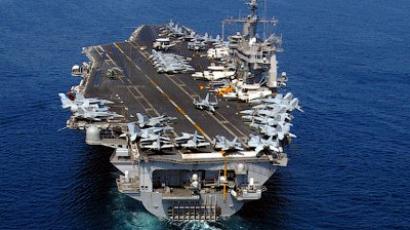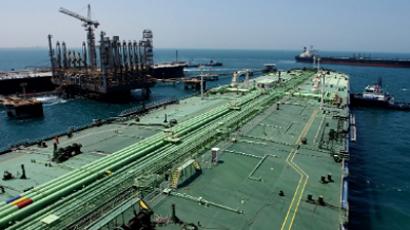‘US government does not seek confrontation over the Strait of Hormuz, but…’
The US says its warships will continue their mission in the Persian Gulf, in defiance of Iran's warning to keep the aircraft carriers well away from its waters.
Iran has been holding naval exercises in the Strait of Hormuz since December 23, and has threatened to close the key oil supply route if new US sanctions hit its exports. It later backed down. However, in an escalating war of words, Pentagon Press Secretary George Little said today that closure of the Strait would not be tolerated.Tensions rose as the USS John Stennis passed through an area where Iran was holding 10-days of naval war games. The drill also saw a number of missiles tested which were said to be long-range, though the Russian military says Iran does not have the capacity to produce inter-continental ballistic missiles.“Such regularly scheduled movements are in accordance with longstanding US commitments to the region’s security and stability, and in support of ongoing operations,” Little told reporters, speaking of USS John Stennis’ route.Such carrier strike group deployments are needed to maintain continuity and operational support to ongoing missions in the US Central Command area of responsibility, he added.“Our interest is in safe and secure maritime passage for ships transiting the Strait of Hormuz,” Little said. “No one in this government seeks confrontation over the Strait of Hormuz. It’s important to lower the temperature.”Little stressed that US transits of the Strait of Hormuz continue to be in compliance with international law, which guarantees their vessels the right of transit passage.The Pentagon press secretary also advised the Iranian regime to “devote its energy and resources to establishing friendly relations with countries in the Gulf region.” Iran is under increasing pressure from Western countries, which believe it might be developing a nuclear weapon. France is pushing for stricter sanctions against Iran and has urged EU countries to follow the US in freezing Iranian central bank assets and imposing an embargo on oil exports. On Tuesday, French Foreign Minister Alain Juppe said he “has no doubt” that Iran is “pursuing the development of its nuclear arms,” and appealing to the EU to agree sanctions for the Islamic republic by the end of January.Asia Times correspondent Pepe Escobar says new sanctions adopted by the US are over the top.“Can you imagine if this was another way around – if these sanctions were against American exports of oil? Or if the sanctions were against China, for instance? It is an act of war. The thing is, how are you going to implement it and who is going to respect it?”Escobar told RT. “The French Foreign Ministry pathetically saying: ‘Look, we have to curb our imports of Iranian oil’ – what’s going to happen to the European economy if that happens?”
Ali Rizk, an expert on Middle Eastern affairs, believes that both the US and Europe are currently "witnessing a very dire economic situation," and that "this latest step taken against Iran will only, of course, set the precedent for increasing economic problems for the West in general.”Rizk notes two main motives behind the US policy towards Iran: US president Barack Obama’s wish to prove himself in an election season, and American’s fear of a unilateral Israeli attack on Iran.“By taking this step, Obama on the one hand is answering his Republican challengers, and on the other hand he is trying to satisfy Israel.”At the same time Rizk strongly doubts the conflict will reach military status, but “there will be continuous escalation and a continued cold war between the US and Iran.”
Meanwhile the EU has agreed in principle to ban imports of Iranian oil, a measure Rizk says is unlikely to be put into practice, though it remains to be seen.














